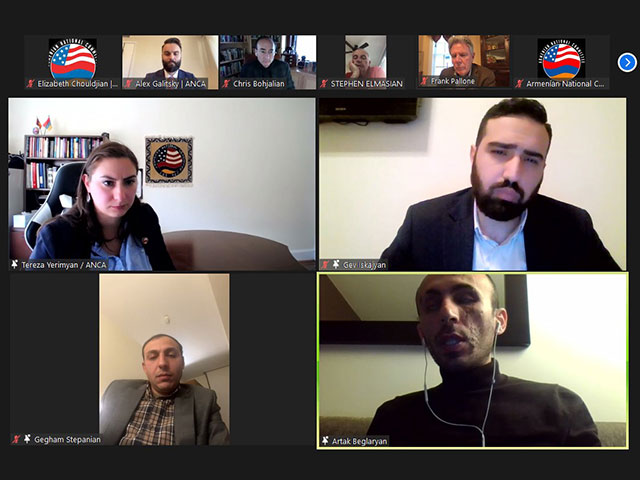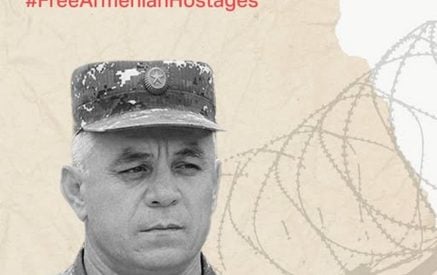Azerbaijani Sanctions; Emergency Aid for Artsakh are top priorities shared with Rep. Pallone and over 50 Congressional staff in hour-long online discussion
WASHINGTON, DC – America’s response to Azerbaijan’s nine-day blockade of the Republic of Artsakh, the need for emergency U.S. assistance to Artsakh, and sanctions against Azerbaijan were discussed during an hour-long briefing provided to Congressional Armenian Caucus Co-Chair Frank Pallone (D-NJ) and over 50 Congressional offices by Artsakh leaders and the Armenian National Committee of Artsakh (ANC Artsakh).
Armenian National Committee of America Government Affairs Director Tereza Yerimyan coordinated and hosted the briefing, which included detailed updates and analysis by Artak Beglaryan, the advisor to the State Minister of Artsakh; Gegham Stepanyan, Artsakh Human Rights Defender; and ANC of Artsakh’s Gev Iskajyan. Beglaryan and Stepanyan were reporting from Yerevan, both unable to reunite with their families in Artsakh due to Azerbaijan’s blockade; Iskajyan was sharing on-the-ground insights from Artsakh’s capital, Stepanakert.
In opening remarks, Yerimyan outlined the consistent pattern of Azerbaijani violations, from cross-border firing, extrajudicial killings of Armenian civilians and POWs, to cutting off access to power, gas, and telecommunications to Artsakh, and the September, 2022, attack against Armenia, as a result of which Azerbaijani troops continue to occupy sovereign Armenian territory. “Sadly and simply put, the blockade of the Lachin Corridor fits into this pattern of Azerbaijani aggression,” explained Yerimyan. In response, the ANCA has called for emergency U.S. assistance to Artsakh and sanctions against Azerbaijan, beginning with the enforcement of Section 907 and stopping all U.S. military aid to the corrupt Aliyev regime.
Read also
Beglaryan, Stepanyan, and Iskajyan then shared details of the ongoing humanitarian crisis caused by Azerbaijan’s blockade of the Lachin corridor – the only road connecting Artsakh to the outside world – closed by Azerbaijan since December 12th.
Noting that Azerbaijan’s blockade is both a violation of international law and of the November 9, 2020, tripartite Russia-Azerbaijan-Armenia agreement, Beglaryan called on the international community to apply sanctions on Azerbaijan. “We have seen that Azerbaijani impunity generates new and larger crimes, like this one,” stated Beglaryan. He argued that statements of condemnation may affect the duration of this current blockade but concrete sanctions – economic, military, or others, — will help prevent future similar crimes. “Unless there are serious and strong sanctions against Azerbaijan, the Azerbaijani side will continue its genocidal policy and will one day ethnically cleanse the Artsakh people. Azerbaijan wants Artsakh without the Artsakh people,” stated Beglaryan.
Stepanyan concentrated on the humanitarian crisis and its implications resulting from the Azerbaijani blockade, noting that Artsakh currently has 120,000 people – including 30,000 children, 20,000 elderly, and 9,000 with disabilities – who are completely isolated from the world – both by land and by air. One-thousand-one hundred Artsakh residents – including 270 children – are currently in Armenia, unable to return and reunite with their families. Medical supplies and food are in short supply. “The humanitarian situation is getting worse and a quick response by the international community – by different states – is more than needed, and I ask you to make every effort to help the people of Artsakh overcome this challenge,” stated Stepanyan.
Iskajyan, who moved to Artsakh from California in May of 2022, to work with the ANC Artsakh, explained that this latest blockade is part of an ongoing pattern of aggression by Azerbaijan with the goal of ethnically cleansing the Armenian population. Iskajyan noted that Azerbaijan has cut off gas supplies to Artsakh twice in the past year – both times during freezing weather conditions. In visits to local hospitals, Iskajyan spoke with physicians who reported that numerous patients in intensive care require immediate transport to Yerevan for treatment. Regarding food resources, Iskajyan reported that rationing has already begun nine days into the blockade. “Here, we are in a race against time,” stated Iskajyan. “Every day, every minute, every second that this blockade is in effect there are less supplies, there is less food, there is less medicine, there are less resources for the kids, for the population, for the elderly.” Iskajyan reiterated Beglaryan and Stepanyan’s call for Azerbaijani sanctions. “If we don’t see the cutting of military aid, if we don’t see the enforcement of sanctions, Azerbaijan will not show movement on this end.”
Rep. Pallone noted that the Congressional Armenian Caucus is continuing to do its best – both publicly and privately – to press the White House and State Department to take action to lift the blockade of Artsakh. “It’s no surprise to me that this is part of Azerbaijan’s ongoing effort of ethnic cleansing – there’s no question, that’s what we are seeing,” stated Rep. Pallone.
Over 45 Senators and Representatives have already condemned Azerbaijan’s blockade, including Senate Foreign Relations Committee Chair Robert Menendez (D-NJ) and Senate Armed Services Committee Chair Jack Reed (D-RI). See the full list at anca.org/blockade.
Since the first day of the blockade, the ANCA has been working with the White House, State Department, and Congressional leaders – urging them to stop U.S. military assistance to Azerbaijan and to send emergency humanitarian assistance to Artsakh. Thousands have already used the ANCA online portal – anca.org/blockade – to call, tweet, and write the White House and Congressional leaders to address this enfolding Artsakh humanitarian crisis immediately.
























































